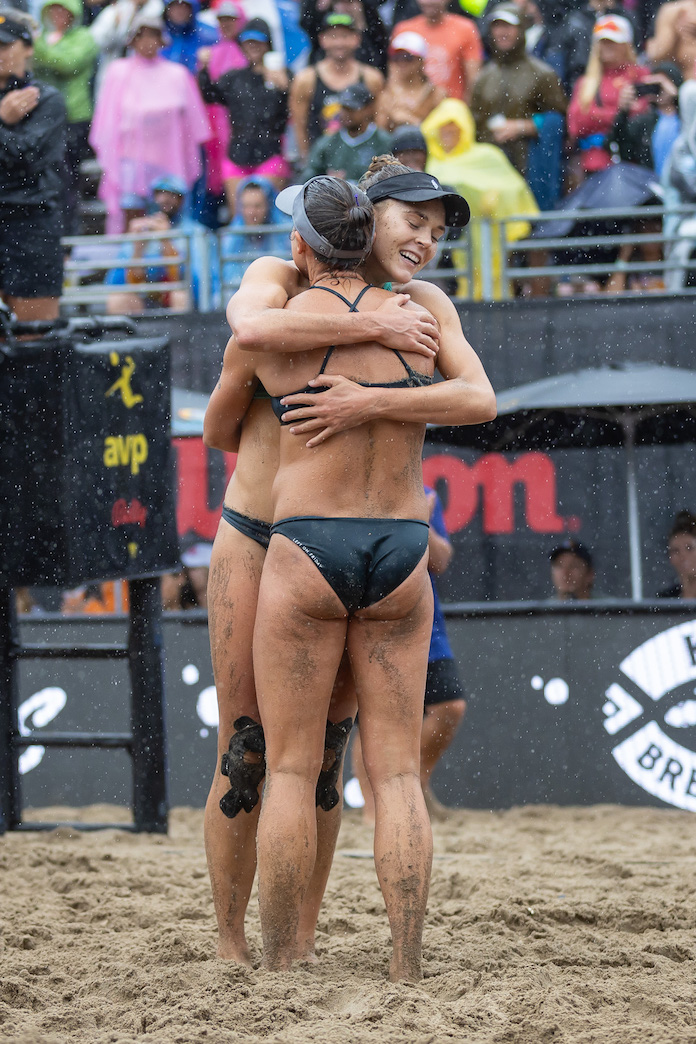SANDCAST Mailbag: Are Tri and Chaim out of the Olympic race? New AVP partnerships?
May 8, 2024
August 20, 2023

MANHATTAN BEACH, California — There is the path less taken to a Manhattan Beach Open title.
Then there is the path taken by Betsi Flint and Julia Scoles.
The maximum number of matches one can play in winning a Manhattan Beach Open championship is nine.
Flint and Scoles played nine.
No team in Manhattan Open history has pulled off such a feat.
They lost five sets and didn’t even win the point differential battle in their third match of the tournament, a 21-17, 13-21, 15-11 victory over Carly Kan and Lexy Denaburg. Twice, they won via forfeit and thrice they won in three sets.
The final, which on the surface appears to be a relatively reasonable 22-20, 21-13 win over Kelley Kolinske and Hailey Harward was, of course, nothing close to relatively reasonable. It was played in a modest hurricane, on their third match of the day despite the hour only being 10 a.m., a few hours before a 5.0 earthquake would hit — yes, there was one Sunday north of here — because what’s normal anyway these days for Flint and Scoles?
Flint’s tried the normal way of winning this tournament. Two years in a row, she made the finals without dropping a single match, in 2021 with Emily Day (now Capers) and 2022 with Kelly Cheng. Even held a 13-10 lead in the third set a year ago.
Would have been too normal. Too smooth. Not nearly enough adversity involved.
Instead, Flint’s first and long-awaited Manhattan Beach Open title came in the longest manner possible, as the only team to ever win in Manhattan after losing their first match, with a partner in Scoles who spent nearly as much time in the medical tent as she did on the court, with rain dumping in record numbers … in August … due to the first hurricane that has hit California in 84 years.
That’s all a drenched Flint needed to get her name on the Pier, the tradition in which the victors of the Manhattan Beach Open are inscribed into a plaque and cemented into the pier.
The day started early on Manhattan Beach. With a storm headed to Southern California sure to bring, at the least, a lot of rain, the AVP chose to start at 7 a.m. Sunday. Subsequently, the title matches were not streamed live on either ESPN+ or the Bally Live app, but were shown later Sunday in their regularly scheduled time slot on ESPN2. And even that was delayed a few minutes as a pro softball game finished up.

If this seems an exceptional weekend for Flint and Scoles, it is actually quite ho-hum. Run of the mill, really. In New Orleans earlier this year, they dropped their first match and nearly made the finals, losing 16-14 in the third set to eventual champs Kelly Cheng and Sara Hughes. In Montreal just a few weeks ago, they found themselves down 14-9 in the third set to Brazilians Duda Lisboa and Ana Patricia Silva, only to dig deep into their bag of magic tricks and pull off the wildest comeback of the year.
“We know sets aren’t over until they’re over,” Flint said then.
She’s an eternal optimist, Flint. Her proverbial glass could be bone dry, shattered, and swept into the recycling bin and she’d still find a way to claim it’s at least half full. Did she want to wake up before dawn and play a 7 a.m. quarterfinal, against second-seeded Corinne Quiggle and Sarah Schermerhorn? Not particularly. But there was a hurricane coming, and the schedule had to be expedited, so if that’s what she had to do, then she’d do play.
They’d play some of their best volleyball of the season, too, sweeping the Hermosa Beach champs (21-19, 21-13), sweeping the hottest team in the tournament, Zana Muno and Deahna Kraft (21-13, 21-11) and sweeping Kolinske and Harward (22-20, 21-13). For all the adversity and strange circumstances of their victory, Sunday’s run was surprisingly quite normal.

Easy, even.
It wasn’t easy, of course. Nothing is, especially on the women’s side of the AVP Tour. Across the net in the finals was Flint’s first partner, Kolinske, the defending Manhattan Beach Open champ. Defending for Kolinske was Harward, Scoles’ roommate and best friend, one of the brightest talents in the USA who had beaten Scoles in the Fort Lauderdale finals a year ago.
But as they had done all morning on Sunday, Flint and Scoles made it look awfully easy. Flint dug 18 balls in the finals, an absurd clip given that Zana Muno led the AVP in 2022 in digs per set with just a hair over 7. Scoles’ .600 hitting percentage led all four players. It was dominant, ending on a 12-4 run that left no doubt.
But is easy or dominant normal for this team?
Who knows? There are earthquakes and hurricanes happening simultaneously in California.
What’s normal anyway?